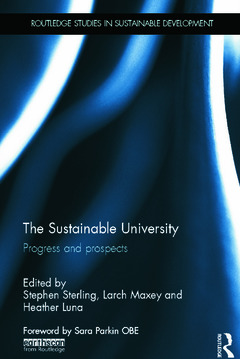The Sustainable University Progress and prospects Routledge Studies in Sustainable Development Series
Coordonnateurs : Sterling Stephen, Maxey Larch, Luna Heather

The direction of higher education is at a crossroads against a background of mounting sustainability-related issues and uncertainties. This book seeks to inspire positive change in higher education by exploring the rich notion of the sustainable university and illustrating pathways through which its potential can be realised. Based on the experience of leading higher education institutions in the UK, the book outlines progress in the realisation of the concept of the ?sustainable university? appropriate to the socioeconomic and ecological conditions facing society and graduates.
Written by leading exponents of sustainability and sustainability education, this book brings together examples, insight, reflection and strategies from the experience of ten universities, widely recognised as leaders in developing sustainability in higher education. The book thus draws on a wealth of experience to provide reflective critical analysis of barriers, achievements, strategies and potential. It critically reviews the theory and practice involved in developing the sustainable university in a systemic and whole institutional manner, including the role of organisational learning.
While remaining mindful of the challenges of the current climate, The Sustainable University maps out new directions and lines of research as well as offering practical advice for researchers, students and professionals in the fields of management, leadership, organisational change, strategy and curriculum development who wish to take this work further.
Introduction Part 1: Context 1. The Sustainable University 2. ESD: Contesting the Market Model of Higher Education? 3. Higher Education and Sustainable Development – an International Perspective Part 2: Aspects 4. Promoting Sustainable Communities, Locally and Globally 5. Leadership 6. The Sustainable Community of a Sustainable University? 7. Curriculum and Pedagogies for ESD 8. Research at the Sustainable University: Fostering New Understandings 9. The Student Experience: Campus, Communities and Transition 10. Wellbeing Part 3: Institutional Change 11. Whole Institutional Change 12. Bottom(s) Up for Sustainability: The Kingston Experience 13. On the Journey - the Green Academy and HEA 14. The Sustainable University - Prospects
Stephen Sterling is Professor of Sustainability Education and Head of Sustainability Education at Plymouth University, and former Senior Advisor on ESD to the Higher Education Academy (HEA). He is a member of the UNESCO Expert Reference Group for the Decade of Education for Sustainable Development (DESD) and was a founder of the Education for Sustainability Programme at London South Bank University.
Larch Maxey is a Research Fellow with the Centre for Sustainable Futures at Plymouth University and the founding Chair of Plymouth Incredible Edibles, a student, staff and community food initiative. He has co-run several sustainable education projects, was founding Chair of Swansea University’s Sustainability Forum and is currently Director of Research with the Ecological Land Cooperative. He is the co-founder of the Transition Research Network.
Heather Luna is a freelance education for sustainability consultant, having worked with the HEA as a project coordinator from 2005 to 2011. She is a Tutor on the Ellen MacArthur Foundation and University of Bradford Postgraduate Certificate in the Circular Economy. She founded Sustainable Thornbury, a Transition Initiative, and is active in the collapsonomics and Dark Mountain dialogue and explorations.
Date de parution : 05-2014
15.6x23.4 cm
Date de parution : 02-2013
15.6x23.4 cm
Thèmes de The Sustainable University :
Mots-clés :
management; Climate Change; Conservation; green education; leadership; campus; curriculum; education; Environmental policy; Environmental studies; Sustainability; Sustainable development; TTX; UK People; UK Research Council; Sustainable University; ESD Activity; Planet Green League; Energy Savings; ESD; UK HEIs; Global Universities Network; Feeds Back; Plymouth University; UN; GA; Kingston University; Tonnes; UK’s Sustainable Development Commission; Business Case; Stem Discipline; ESD Implementation; Sustainability Research; UK Carbon Trust; Sustainability Hub; ESD Research; UK’s Sustainable Development Strategy
